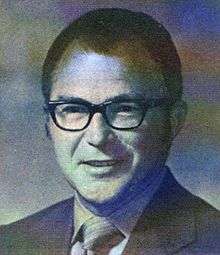Lloyd Meeds

Edwin Lloyd Meeds (11 December 1927 – 18 August 2005), an American politician, served as a member of the United States House of Representatives from 1965 to 1979. He represented the Second Congressional District of Washington as a Democrat.
Meeds was born in Dillon, Montana on 11 December 1927. While in high school, his family moved to Monroe, Washington. He served in the United States Navy from 1946 to 1947 and afterwards owned and operated a gas station. He earned his law degree from Gonzaga University in 1958. Meeds first won election to the House by defeating incumbent Republican Alfred Westland in the election of 1964. Meeds won each of his subsequent bids for re-election with comfortable margins from 1966 up to 1974. In that year, when US District Court Judge George Boldt ruled that treaties entitled Native Americans to half of the fish caught in their usual and customary fishing grounds, Meeds angered many of his constituents with his comment that the tribes had the law on their side and that people needed to move on. As a result, he won his 1976 reelection by only 542 votes, which led to his announcement that he would retire from the House to return to practicing law in 1979.
While a representative, Meeds was known for his work on conservation and education issues. He helped create the Alpine Lakes Wilderness Area and the North Cascades National Park. A memorial to Meeds was erected at the Snow Lake trailhead near Snoqualmie Pass on September 13, 2007, in honor of his work for the creation of Alpine Lakes Wilderness. Snow Lake lies within Alpine Lakes and is one of the most popular day-hike destinations in it. Harvey Manning describes Meeds' work in wilderness preservation efforts in his 2007 book Wilderness Alps: Conservation and Conflict in Washington's North Cascades published by the North Cascades Conservation Council.
In contrast to his conservation efforts in Washington state, Meeds was central to efforts to limit land preservation in the bill that eventually became the Alaska National Interest Lands Conservation Act, signed into law by President Jimmy Carter in December, 1980.[1] Following his retirement from the House in 1979, he became a Washington lobbyist and worked closely with the state of Alaska, Representative Don Young (R-AK), and the Citizens for the Management of Alaskan Lands to limit the scope of federal land preservation in Alaska in the final bill.[2]
He died at his Church Creek, Maryland home.
See also
References
![]() This article incorporates public domain material from the Biographical Directory of the United States Congress website http://bioguide.congress.gov.
This article incorporates public domain material from the Biographical Directory of the United States Congress website http://bioguide.congress.gov.
- United States Congress. "Lloyd Meeds (id: M000626)". Biographical Directory of the United States Congress.
- ↑ Nelson, Daniel (2004). Northern Landscapes: The Struggle for Wilderness Alaska. Washington, D.C.: Resources for the Future. pp. 200–207. ISBN 1-891853-84-8.
- ↑ Nelson, Daniel (2004). Northern Landscapes: The Struggle for Wilderness Alaska. Washington, D.C.: Resources for the Future. pp. 227, 235. ISBN 1-891853-84-8.
External links
| United States House of Representatives | ||
|---|---|---|
| Preceded by Alfred Westland |
Member of the U.S. House of Representatives from Washington's 2nd congressional district January 3, 1965 – January 3, 1979 |
Succeeded by Al Swift |